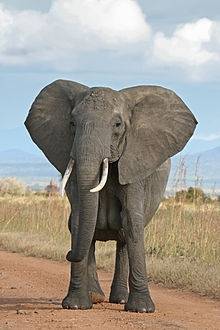 Close Topic Options
Close Topic OptionsElephants
Elephants - Sciences, Education, Art, Writing, UFO - Posted: 4th Oct, 2021 - 9:15am
Elephants
Fight elephants with peppers, U.N. Tells farmers
(Reuters)
Animals and Pets Related News
Reuters - Farmers whose crops are raided by wild animals like elephants should try driving them away with pepper spray, using guard donkeys or booby trapping food with snakes, the U.N. Said on Monday.
Source: Yahoo! News: Animals & Pets News
Image from Wikimedia public domain.

Elephants (Hover)
Elephants
The issue with elephants and crops isn't a new one however I believe they should use humane methods in order to take these animals out of the crops. Right now, a CEO of a famous hosting company is in hot water after he put a video about him killing an elephant. Not only because he shot the animal but the happiness on his face about it.
In the video, Parsons and a team of others shoot an elephant they claim was destroying farmers' crops in the area.
"They've been here three nights in a row, we're hoping they come back for a fourth. And if they do, well, we're gonna be here to greet 'em," Parsons says with evident relish. The team then waits up at night for the elephants to come. When they do Parsons shoots one of them as an accompanying screen graphic says "Bob Parsons fires again. Both shots hit home."
The CEO can then be seen smiling as he stands over the elephant with his gun before another scene shows local villagers hacking the animal to bits, all while wearing orange GoDaddy.com hats. The scene is accompanied by AC/DC's "Hell's Bells" music.
"When you see me smiling in that picture, I'm smiling because I'm relieved no one was hurt, that the crop was saved, and that these people were going to be fed -- the type of smile when you get a good report card or achieve a goal," Parsons told Mashable Thursday. Source 4
Elephants UFO & Writing Art Education Sciences
Elephant calves more likely to survive in the care of their grandmothers
Among the Asian elephants, the grandmothers have a significant role. They ensure the survival of the calves and breeding success for their daughters, new research shows. Ref. Source 5p.
Elephants
Elephants have been known to learn up to 60 commands.
Elephants
Elephants' 'body awareness' adds to increasing evidence of their intelligence
Asian elephants are able to recognize their bodies as obstacles to success in problem-solving, further strengthening evidence of their intelligence and self-awareness, according to a new study. Ref. Source 6q.
Elephants
Capturing elephants from the wild shortens their lives. Humans have been capturing wild Asian elephants for more than 3,000 years, and this still continues today despite the fact that the populations are declining. An international team of researchers has now analysed records of timber elephants in Myanmar to understand the effects of capture. The study shows that even years after their capture, wild-caught elephants' mortality rate remains increased, and their average life expectancy is several years shorter compared to captive-born animals. Source 1h.
Elephants Sciences Education Art Writing & UFO
Elephants strive to cooperate with allies, until the stakes get too high. Asian elephants are keen to cooperate with friends and have evolved strategies to mitigate competition in their social groups, but cooperation breaks down when food resources are limited, according to new research. The study sheds light on the evolution of cooperative behavior in mammals. Source 2a.
 TOPIC: Elephants
TOPIC: Elephants Fight elephants with peppers
Fight elephants with peppers